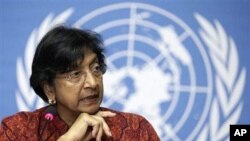The U.N. High Commissioner for Human Rights, Navi Pillay, is denouncing the defamation proceedings against a prominent opposition politician in Cambodia. Pillay said the court case against Mu Sochua shows an erosion of fundamental freedoms in Cambodia.
U.N. Human Rights Chief Navi Pillay called the case against Cambodian Parliament Member Mu Sochua highly politicized. She says it appears to show an alarming erosion of freedom of expression and the independence of the judiciary in Cambodia.
Pillay noted that criminal law is still used to stifle freedom of speech in many countries, and that appears to be what is happening in this case.
In addition to serving in parliament, Mu Sochua is a former minister of women's affairs and a prominent women's rights defender.
Pillay's spokesman, Rupert Colville, says the case against Mu Sochua stems from derogatory comments made in April of last year by Cambodia's Prime Minister Hun Sen.
"It included a reference, for example, to the unbuttoning of her blouse and another reference of a sexual nature, and it led to her bringing a defamation case against Hun Sen," Colville said. "On the 23rd of April, a couple of weeks later, during a news conference, Mu Sochua announced her intention to sue the Prime Minister for defamation on the basis of his remarks and she subsequently filed proceedings on 27 April last year."
In retaliation, Colville says, the Prime Minister sued Mu Sochua the next day on the basis that publicly announcing the intention to sue him was defamatory.
"Mu Sochua's case against Hun Sen was dismissed. Her parliamentary immunity was then lifted, and in August of last year, she was found guilty of defamation against the Prime Minister," Colville said. "The court imposed a fine and awarded damages to the prime minister. Her conviction was subsequently upheld by the Appeals Court in October last year, and the Supreme Court last month, in June. No evidence providing either damage to reputation or malicious intent was presented during the case against Mu Sochua."
Colville says the Supreme Court has given Mu Sochua until July 16 to pay the $4,000 fine imposed on her after her conviction. He says she refuses to pay and that Mu Sochua stands on the verge of imprisonment for exercising her legal right to express her view.
UN Denounces Defamation Case Against Politician in Cambodia
- By Lisa Schlein

UN says case against former minister Mu Sochua stems from derogatory comments made in April of last year by Cambodia's Prime Minister Hun Sen



